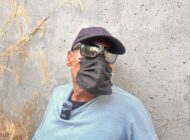For Latino men who are living an unproductive and unsavory life, the National Compadres Network has for over 20 years made efforts through spiritual guidance to change their unhealthy ways.
Armando Gonzalez gives a tour of the cultural center, which serves as a meeting place for the San Fernando Valley circulo. Alejandro Arpiza / El Nuevo Sol
Alejandro Arpiza
EL NUEVO SOL
Ten years ago, Armando González says he could hear and feel his spiritual drum beating loud and clear – the only problem was he did not know where it was coming from.
Now 48, he has gone through what he describes as a re-encuentro—a rebirth or spiritual awakening.
The reasons for his rehabilitation, he said, as he sat peacefully in front of Tía Chucha’s Cultural Center in Sylmar one quiet evening as the sun was setting near El Cariso Park, is the Círculo de Hombres (Circle of Men) involved in the National Compadres Network.
A self-described former womanizer and recovering cheater and liar, González was introduced to the group by his compañera (spouse) at the time in one of the group’s many spiritual retreats.
“I had no ethics,” said the soft-spoken González, standing over six-feet tall. “I never knew half the stuff I was getting introduces to [by the Compadres Network] as far as being a man, a hombre de palabra (a man of his word). These things were not passed down to us.”
However, the NCN has for over 20 years now, been guiding and rehabilitating predominantly (but not limited to) Latino males who have been leading harmful and unproductive lives – be it drug abuse, gangs, extra-marital affairs or poor parenting skills.
The spiritual and social network of men was established in 1988 by Jerry Tello along with a number of his University colleagues at the time.
The Compton native and his friends came together as a response to what he says was the overwhelming number of Latino men who were losing their spirits through their undesirable behaviors or habits and the need for a re-encuentro.
“The first revolution is within your self,” said Tello in a phone interview. “No one was going to save us. No support system existed.”
The journey to rally support, early on, even amongst his own circle of friends and colleagues at times was difficult, he remembered, having to combat the concept of machismo and what he calls “false manhood.”
Nevertheless, Tello and his hermanos (brothers) ran through the necessary gauntlets of resistance and put together the first meeting with a MEChA conference. The retreat attracted participants from as far as Texas, the Mid-West, New York and Mexico.
There, the foundation of what it means to be un Hombre Noble (Honorable Man) was introduced. As the general platform, so to speak, for the Compadres Network, there are seven principles for becoming and maintaining this spiritual and personal righteousness. Among these is the principle of being un Hombre de Palabra, someone who gives his word and stands by his commitment.
The spiritual retreats and monthly meetings incorporate a heavy influence of indigenous culture and rituals, such as the burning of sage, sweat lodges and the ever-present prayers accompanied with the beating of drums.
Yet, the group’s focus is not just centered around all things indigenous. The word Compadre in itself is a very special and meaningful word in the Latino culture, both in the US and across Latin America. The word bestows more than friendship upon someone—it symbolizes ones desire to establish and maintain a kinship with someone who might not even be a blood relative.
Some of the oldest origins of the word can be traced to Mexico’s earliest days as a country, where a familial or friendship bond was even further solidified if a husband and wife were either asked to be the Godparents of a newborn child or offered to be.
Though the term is still used today in the same fashion, it is now also used to convey endearment and a friendship bond, somewhat like an extended family. And it is in this fashion that the now nation-wide group uses the term.
According to the NCN website, the group is currently operating through círculos (branches) in over 50 different cities.
One of the people to join the NCN and contribute to its spread since the mid-90s was Hector Sánchez, a graduate of Chico State, now 44.
The Santa Barbara native was working in his community on a campaign to reduce and prevent teen pregnancy when he met Tello. His involvement with the network led him to establish the first circulo there.
“The very first meeting we had no one showed up,” said Sánchez. I told Mr. Tello that nobody showed and he asked me, ‘were you there?’ “
When Sánchez said yes, Tello responded by saying, “Then there was a círculo.”
Now residing in San José, and a member of that círculo, Sanchez is happy to say that the one he helped establish is still thriving.
“It’s hard to get the ball rolling,” he said. “But once it does the community expects that [participation].”
Like González, Sánchez was instantly drawn to the retreats and the messages being conveyed. However, he was more impressed in the manner in which the dozens of male participants were conducting themselves and interacting with one another – primarily because, as he notes, the retreats strictly prohibit the use of alcohol or other substances.
He stated that his experience there was treasured more because for one of the first times in his life, he was interacting with Latino men who were not reliant on intoxication to enjoy the social gathering. Instead, he recalls, the participants were treating each other with a heightened sense of mutual respect and brotherhood.
The círculos and retreats bring together men from all economic and professional backgrounds, which both Sánchez and González treasure as much as the teachings.
“That’s the beauty of it,” said Gonzalez. “They struggle through this thing called life just like anyone else. The first retiro I went to, I was shocked to see people I know and say to them, ‘hey I’ve read your book.’ “
The first time González heard Sánchez speak, he knew he had arrived to where his spiritual drum was coming from. He was impressed by Sánchez’s manner of speech and quiet confidence.
“I said to myself,” González remembers with his warm and inviting smile, ‘I want that peace, that puro amor (pure love).’ “
As Tello sees it, that is essentially what the círculos are all about. Just don’t call them simply a rehabilitation or support group.
“It’s a way of life.”
Tags: Alejandro Arpiza Armando González Chico State Hugo Sánchez Jerry Tello National Compadres Network









